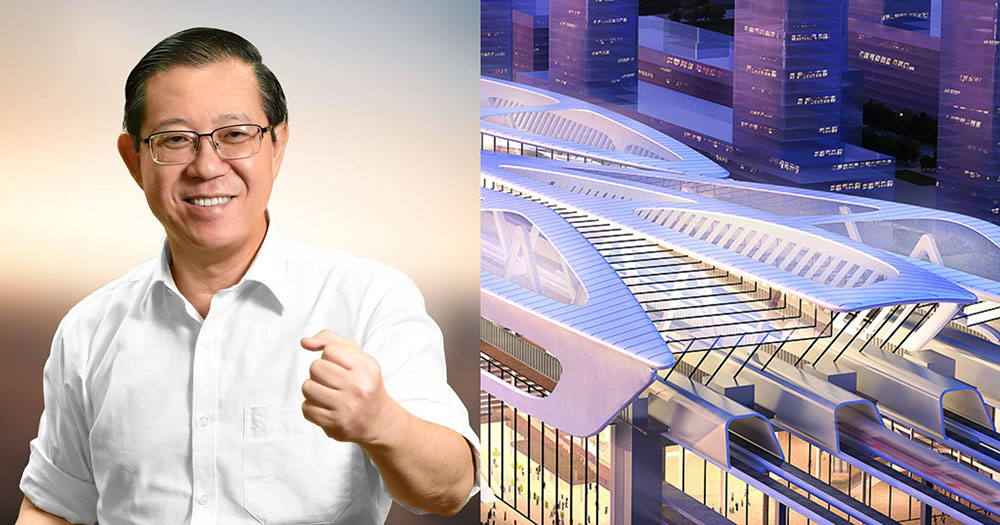Follow us on Telegram for the latest updates: https://t.me/mothershipsg
Malaysia' former finance minister Lim Guan Eng said that without Singapore, the High-Speed Railway (HSR) that Malaysia is embarking on is "not feasible", The Malay Mail reported.
HSR ending in Johor Bahru instead of Singapore financially unsustainable
His remarks were reportedly made in the wake of an announcement that a study on the HSR link between Kuala Lumpur and Johor Bahru had been completed.
Lim said in a statement: "This is not feasible as it raises questions about the project’s financial sustainability as well as limiting its positive economic impact to the country, if the HSR does not stop in Singapore."
However, Free Malaysia Today (FMT) reported a different context to his remarks, highlighting that it had been made after the government decided to revive another project that had been scrapped in 2018 under the Pakatan Harapan (PH) administration: the Trans-Sabah Gas Pipeline (TSGP) and Multi-Product Pipeline (MPP) project, in which 88 per cent or RM8.3 billion ((S$2.7 billion) of its RM9.4 billion (S$3 million) price had already been paid, despite only 13 per cent of the work being done.
Lim was also quoted as saying: "Many question the wisdom of the government in terminating the HSR line at Johor Bahru instead of in Singapore, despite the earlier promise to continue with the original HSR plan."
Lim: Should Malaysian government have paid S$102 million compensation to Singapore?
Both media outlets also reported Lim's remark that questions had been raised about the government's decision to pay Singapore RM320 million (S$102 million) in compensation for ending the HSR.
Lim added that under the original HSR project, states such as Johor, Melaka, Negeri Sembilan, and the Klang Valley would have benefitted from the closer ties the project would have established between towns and cities in these states, along with the Singapore.
He also defended the PH administration's decision to cancel the project under its watch, stressing that the government at that time "had not questioned the rationale".
The Malay Mail quoted him as saying that the government "had wanted to relook at the exorbitant pricing and the cost structure agreed to by the previous BN (Barisan Nasional) government".
Lim elaborated:
"PH had proposed a better solution to be found through the cost savings of billions of ringgit from terminating these scandalous projects, and be returned to Sabah and the states involved in the form of much needed roads, water and infrastructure projects.”
How did Singapore and Malaysia get to this point on the HSR?
The HSR between Singapore and Kuala Lumpur was cancelled earlier this year after both countries were unable to reach an agreement regarding several changes to the project that were proposed in light of the Covid-19 pandemic.
Announcing news of the cancellation in January 2021, Singapore's Ministry of Transport said Malaysia had to compensate Singapore for "costs already incurred by Singapore in fulfilling its obligations under the High Speed Rail Bilateral Agreement".
The project, which was originally mooted in the 1990s, had been repeatedly shelved due to cost issues.
Then, at the 2013 Singapore-Malaysia Leaders' Retreat, former Malaysian Prime Minister Najib Razak and Singapore's Prime Minister Lee Hsien Loong formally agreed to build a High Speed Rail link between Kuala Lumpur and Singapore.
It was touted as a game changer, allowing travellers to zip between Singapore and Kuala Lumpur within 90 minutes.
Both countries signed the Kuala Lumpur–Singapore High Speed Rail Bilateral Agreement in December 2016.
In 2018, Mahathir Mohamad, who became the country's seventh prime minister after his PH coalition won the May general election, requested the suspension of the HSR project, citing high construction costs.
In September that year, both countries agreed to suspend the HSR project until May 2020.
Malaysia subsequently reimbursed Singapore S$15 million in abortive costs for putting the project on hold.
In February 2020, Mahathir resigned amid a political crisis.
His successor, Muhyiddin Yassin, proposed changes to the HSR project and requested to extend the suspension to Dec. 31, 2020 in order to discuss the changes.
"During the suspension period, Malaysia has proposed some changes to the HSR Project, and we have been discussing them in good faith with Malaysia," said Singapore's Ministry of Transport on Nov. 26, 2020.
Subsequently in January 2021, Malaysian media reported that the Malaysian government intended to go ahead with the HSR project without Singapore, and pay up around RM300 million (about S$100 million) as compensation for terminating the HSR bilateral agreement.
Follow and listen to our podcast here
Left photo from Lim Guan Eng Facebook, right photo artist impression of the Singapore HSR Terminus.
If you like what you read, follow us on Facebook, Instagram, Twitter and Telegram to get the latest updates.
